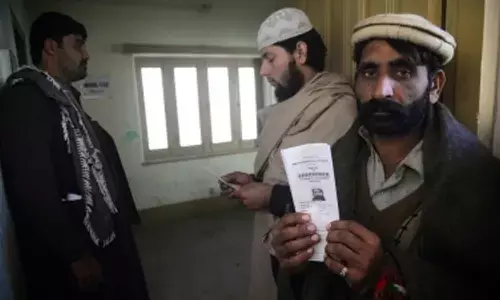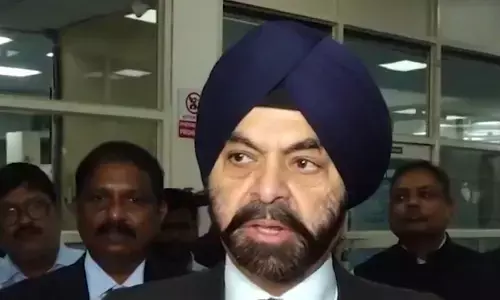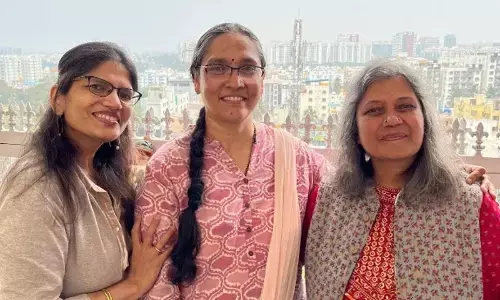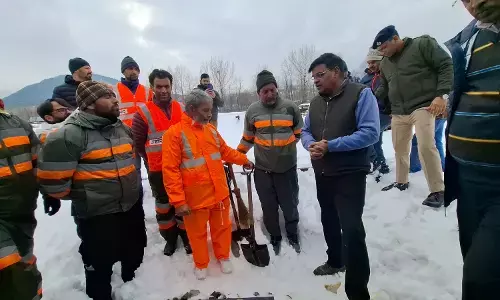Smart City Vizag: What it means

Smart City Vizag: What It Means. Battered by Hudhud cyclone, hardened by bitter experience and completely being devoured by green canopy – the city of destiny recovered in shockingly shortest time itself proof that under the dynamic leadership qualities of our Chief Minister & upright district administration, particularly peach loving people of Visakhapatnam can be more promising to be smartest city in future that can be emulated by other states.
Battered by Hudhud cyclone, hardened by bitter experience and completely being devoured by green canopy – the city of destiny recovered in shockingly shortest time itself proof that under the dynamic leadership qualities of our Chief Minister & upright district administration, particularly peach loving people of Visakhapatnam can be more promising to be smartest city in future that can be emulated by other states.
Of late, Urbanization of Visakhapatnam accompanies with conducive environment for investor community for creation of more employment opportunities and economic activities while improving the quality of life substantially. It also allows an opportunity to learn from good practices and mistakes made in the past by way of centralized development. As the fruits of development reach an increasingly large number of people, a neo middle class is emerging which has the aspiration of better living standards. So, the Prime Minister has a vision of developing ‘one hundred Smart Cities’, emphatically Visakhapatnam is the first of three in the offing.
.jpg)
Smartness in a city means different things to different people in Vizag. It could be smart design, smart utilities, smart housing, smart mobility, smart technology etc. Therefore, it needs sustainability to offer economic activities and employment opportunities to a wide section of its residents, regardless of their level of education, skills or income levels. In doing so, a Visakhapatnam needs to identify its comparative or unique advantage and core competence in specific areas of economic activities and promote such activities aggressively, by developing the required institutional, physical, social and economic infrastructures for it and attract investors and professionals to take up such activities. It also needs to support the required skill development for such activities in a big way. This would help the City grow Smart in developing the required environment for creation of economic activities and employment opportunities. Apart from employment, it is also important for a Smart City to offer decent living options to every resident. This would mean that it will have to provide a very high quality of life (comparable with any developed European City) i.e. good quality but affordable housing, cost efficient physical, social and institutional infrastructure such as adequate and quality water supply, sanitation, 24 x 7 electric supply, clean air, quality education, cost efficient health care, dependable security, entertainment, sports and robust, high speed robust inter-connectivity, fast and efficient urban mobility etc.
Visakhapatnam needs to attract investments and experts & professionals. Good quality infrastructure, simple and transparent online business and public services processes that make it easy to practice one’s profession or to establish an enterprise and run it efficiently without any bureaucratic hassles are essential features of a citizen centric and investor-friendly city. Adequate availability of the required skills in the labour force is a necessary requirement for sustainability of a Vizag City. Local Entrepreneurs, themselves, look for a decent living and so they also look for smart housing, high level of healthcare, entertainment and quality education. Safety and security is a basic need for them as to any other resident. Besides an entrepreneur or a professional needs to be there as someone who helps a Vizag city to prosper and adds value to rather than someone who only benefits from it.Visakhapatnam should have smart (intelligent) Physical, Social, Institutional and Economic infrastructure, (the four pillars on which a city rests) while ensuring centrality of citizens in a sustainable environment. It is expected that such a Smart City will generate options for all residents to pursue their livelihoods and interests meaningfully and with joy.
INITIVATIVES FOR VISAKHAPATNAM AS A SMART CIY
Institutional Infrastructure (including Governance) : The District Administration’s structures should focus on involvement of citizen participation in decision-making process to get the feel of ownership of city. Typically, the principle to be followed is “Governance by Incentives rather than Governance by Enforcement”. This would imply that people do the right things because they are good for society or there are incentives to do so and not due to the fear of penal action. However, a greater sense of respect for civic discipline needs to be brought in through deterrents to civic indiscipline. Also, decisions will need to be taken at the local level and with well-established processes through which citizens can actively participate in such decision making. However, it is to be ensured that all such decisions are taken without any arbitrariness, discrimination and subjectivity. This can be brought in by ensuring that all information is imparted on real time basis through infusion of technology and very strong Service Level Agreements (SLAs) so that human intervention is bare minimum. It also needs to be recognized that management of city comprise of multiple systems, all of which are closely connected in meeting human needs. A Smart City is one where each of these systems works in harmony and reinforces the usefulness of the other. Therefore, Visakhapatnam needs a comprehensive approach to the development of a city is essential. This requires that the current practice of working in silos needs to be broken down with greater institutional integration, at least in planning and oversight. Thus, while developing smart cities, it is important to adopt a holistic approach rather than a sectoral approach. More specifically, Greater Visakhapatnam Municipal Corporation should be fully automated so that citizens have the ability to seek and the municipal offices have the ability to deliver services in real time, through IT based facilities. Public participation in governance should be made possible through the social media and by making all information available in the public domain.
Physical Infrastructure: The rapid urbanization of Visakhapatnam has resulted in unplanned development and urban sprawl. Most of the CBD (Central Business Districts) like Jagadambha and Dwarakanagar are marred by congested and deteriorating city core. So, we should give more emphasis to planned development and decongestion of the CBDs. Further, many policies of our city are old and need to be reviewed in view of the changing needs of the city. The building bylaws are archaic and the provisions like parking space requirements and building heights etc. provided, do not meet the demand for the present day. Land in Visakhapatnam city is at a premium and the existing FARs (Floor Area Ratio) does not permit development of high rises, which results in high cost of housing. To ensure availability of affordable housing for every citizen, the existing FARs and bye-laws needs immediate revision. This would also ensure that Transit Oriented Development (TOD) is implemented along public transport corridors. This would have multiple benefits like financial viability of the transit system, reduction in use of personalized vehicles and cleaner environment etc. The State government would assist all identified City Development Plans based on ICT, GIS and Spatial Mapping.
Visakhapatnam is facing with rapid motorization. This has led to severe congestion, deteriorating air quality, increasing incidence of road accidents and a rapidly increasing energy bill. Public transport systems have been planned in isolation with the result that a well-integrated multi-modal system has not come up. Ease of being able to move from one place to another is at the core of a “Smart City”. If cities are to be efficient engines of economic growth, it is important that goods are able to move from production centers to consumption centers at low cost and high speed. Therefore, a good freight movement system acquires importance. Hence, Visakhapatnam needs to look into the bottlenecks and improve mobility by adopting three pronged approach whereby there are: 1. Improvements in public transport – Metro Rail, BRT, LRT, Monorail, etc. 2. Improvements in infrastructure of other motor vehicles – ring roads, bypasses, underpasses, elevated roads, improvements in the existing road ways 3. Improvements in infrastructure for walking, cycling and waterways.
Greater Visakhapatnam Municipal Corporation (GVMC) should follow model of (ABC) Active, beautiful and Clean in a smart way. Improve and integrate the holistic approach for sanitation by introducing solid waste management by segregation of garbage for recycling, UGD (underground Drainage) system should be full proof, rain harvesting management for timely need of water, Water treatment plants for recycling , creation of energy from waste and taping of solar power for future requirement, developing labs for checking pollution in nearby surroundings, underground exclusive cable ducts for electrical and optical fiber instead of overhead wires to reduce the persistent problem, building of public toilets at every tourist destination and private toilets for mitigating the menace of open defecation, preventive measures should be taken before construction of unauthorized buildings not after that. To achieve all this, citizen engagement should go beyond public consultation to powerful deliberation by exchange of ideas and create sense of ownership to the cause. Delivery of services in a transparent way is part of smart governance.
Social Infrastructure: Visakhapatnam has quality educational facilities, both for schools and higher education and centers of excellence like Andhra University and Gitam University. Another feather in the crown is Indian Institute of Management. This can be achieved with e-education and digital content. Another sector which is in dire need for improvement is healthcare. Visakhapatnam urban area lacks strong healthcare infrastructure, on the other hand, it has several inherent weaknesses in its healthcare system. The segment is dominated by more private and corporate hospitals confined to the urban city limits. Very few have made inroads in districts and mandal levels, which pose a challenge and opportunity to not only increase the penetration of quality health services but also be the growth driver in this region. Some of the successful Public Private Partnerships (PPP) involving laboratory services (pathology, radiology, CT scan, MRI etc.), mobile medical units, PHC management, telemedicine services and hospital maintenance, high end tertiary care, community insurance schemes are other opportunities where private sector will need to participate aggressively . Therefore, the need of the hour is to develop HEALTH CITY at Visakhapatnam on a fast track basis. Apart from this, we have good entertainment facilities make the people in a city happy like Theatres, IMAX, auditoriums, cultural centers, open spaces and plazas allow opportunities for recreation, so important for healthy and happy living. At the same time, we need to build world class indoor and outdoor stadiums, swimming pools, sports complex and golf courses on par with other countries.
Economic Infrastructure: Visakhapatnam should adopt tariff structures such way that they are affordable for the poor and yet recovery costs at higher levels as use. The revenue gaps can be bridged by innovative means to raise and allocate resources to the service providers such as Purchasable FAR, Development Charges, New roads, underpasses, Metros, Elevated roads etc. Use of the private sector would be a good way of tapping efficiencies in delivery to reduce costs. Independent Regulators for electric supply, water supply, property taxes etc., need to be appropriately placed. Visakhapatnam needs to create of more start-up eco-system requires an incubator being set up and spreading the culture of innovative thinking and finding solutions to everyday problems through technological intervention. It requires specific expertise and needs to be done with a long-term view towards making the process sustainable. Visakhapatnam city should house an incubator each and 1000 start-ups per incubator shall create at least 1000 jobs per year. The host institute of incubators may house self-sustainable ‘live-work-play’ campuses for the start-ups through these incubators to provide them with a vibrant atmosphere for innovation. The concept of live and work has should be engrained in the philosophy of Smart city. Incubation and start-up ecosystems are still at a very nascent stage in Visakhapatnam and the sustainability model is still being figured out. The required support from the government for a 5 year period in the form of : a) financial support for the host institute of the incubator for each start-up incubated at the rate of Rs 12,500 per month, b) Infrastructure development fund to establish the live-work-play campus, c) Tax break and incentives for the incubators and incubated start-ups within smart cities d) Supports and incentives for large organisations working with the incubators for setting up innovation zones that will provide start-ups technology support and market-access opportunities Support for the incubators to roll out programs that will in spreading the message of entrepreneurship and develop the pipeline that will continuously attract start-ups and encourage youngsters to take up innovation and entrepreneurship seriously.
A mechanism for financial hub has to be developed keeping the social and the physical infrastructure in mind. We should have vibrant and functional financial hubs like major banks and/or stock exchanges as well as other financial services. They have to be developed in areas due to externalities, as well as supportive government. There are several existing financial instruments that Visakhapatnam city may apply in order to attract private finance for urban green infrastructure: Private sector involvement in urban green infrastructure which can take the form of public-private partnerships (PPPs), in which the long-term risk is transferred to the private sector / Through an alternative instrument, tax increment financing, future tax revenues are used to attract private finance / Real estate developers which may also pay for the infrastructure that is needed to connect their new development to existing infrastructure in the form of development charges (impact fees) and value capture (taxes that capture the value increases of real estate due to new infrastructure development nearby / Finally, loans, bonds, credit rating of ULBs and carbon finance are instruments used to attract private finance in well-functioning capital markets.
By G SAMBASIVA RAO
The author is Vice President, The Andhra Chamber of Commerce And Industry Federation















